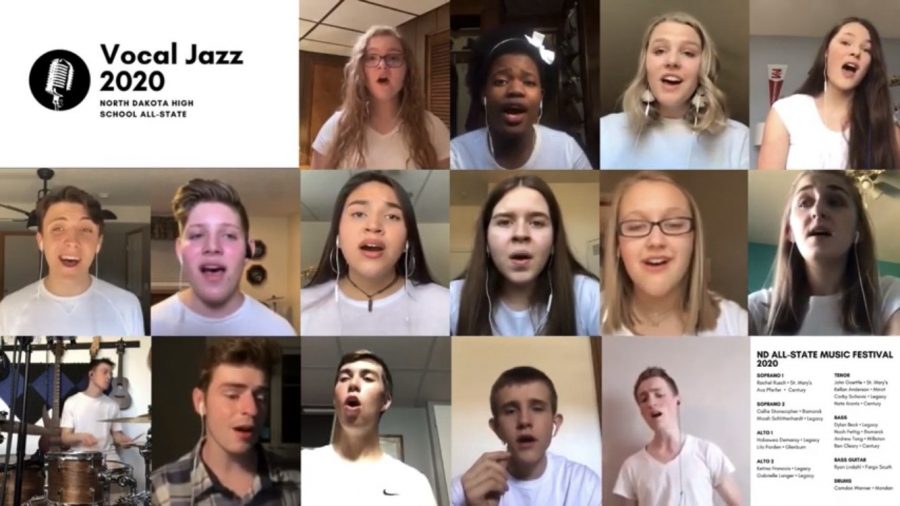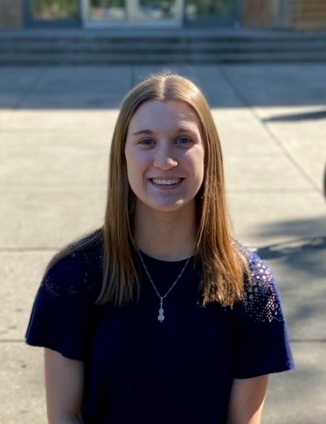A broken rhythm
With many state-wide music events canceled and class moving online, music students have been forced to change the way they interact with their craft.
May 1, 2020
The sudden switch to online learning in the face of the COVID-19 pandemic left teachers across the world with many questions. In particular, music teachers were left wondering how to manage classes that revolve around a constant collaboration between students and their conductor.
Another consequence of the pandemic is the cancellation of most local, regional and state music events for the foreseeable future. As with many aspects of the COVID-19 quarantine, this news hit seniors especially hard.
“Memories I should have made that would have lasted years now aren’t a possibility, and I’ll never have a chance to do most of these events ever again,” BHS senior Callie Stonecipher said. “As a senior, this was supposed to be my last run at everything, and it’s all ending before it started.”
To showcase the progress they have made throughout their music education, many seniors who are part of music programs hold a recital in the spring of their last high school year. Senior recitals are often a right of passage on a musical journey that will hopefully continue in college and beyond, but it seems that they will join the ever-growing list of activities that this year’s senior class may not get to experience.
“Seniors are grieving the loss of many milestone activities in their final year at BHS,” BHS choir teacher Brian Saylor said.
However, seniors are not the only grade level disheartened by the pandemic’s effect on music education. Communication and passion form the basis of any successful music ensemble, but the former can be tricky to achieve in a virtual meeting.
“Coming together with the expressed purpose of making music builds a bond around a common interest, talent and work ethic,” Saylor said. “Right now it is difficult, and maybe even impossible, to create that same sense of community among our BHS ensembles.”
So how have music teachers attempted to foster musical growth even during this time in isolation? As with any class, students are given assignments, but they might not resemble typical bookwork or a worksheet.
“We had to learn one minute of a song from the 70s as our first assignment,” BHS senior Saffron Kulackoski said. “I think it’s really great that Peske and T [Mr. Taffelmier] are trying to keep us playing during the quarantine.”
Similarly, students in the BHS orchestra program complete one assignment each week, in addition to attending a video chat. Despite not being able to interact with her students as she normally would in the classroom, orchestra teacher Dana Van Heukelom hopes that students can still make progress during this time.
“We may not be able to play as a class, but students are still able to work on their individual skills and grow as a musician,” Van Heukelom said.
According to Stonecipher, the BHS Concert Choir has taken an approach to online music education that involves both hands-on assignments, similar to those used by band and orchestra, and traditional written assignments.
“The hands-on assignments have been something I’ve really enjoyed doing,” Stonecipher said. “These assignments are more open to interpretation and have involved videos of us singing our WDA pieces, and, for me, playing the guitar while singing with my mom.”
Despite music teachers’ best attempts to make their assignments enjoyable, much can still be lost in the transition from face-to-face interaction and distance education.
“Meeting together in one room for both orchestra and choir provides a strong sense of family that meeting on video chats can never copy,” Stonecipher said. “I greatly miss seeing and performing with my friends every day, and the level of musicianship that can be reached in a classroom is, for the most part, greater than what can be reached at home.”
As mentioned before, music students can still make progress independently, but they have to do so without the direct assistance and support of their peers. Regardless, certain skills are developed best by individual practice, and many can be transferable to ensemble playing in the future.
“Individual practice hones our own skills,” Saylor said. “It builds our individual sense of how we sound, how we respond to our instrument [or] voice and helps build our confidence in our abilities and talents.”
So, while quarantine may have opened up more time for independent practice, playing with other musicians is important for developing listening skills and learning how to match other members within an ensemble. Though it is not quite the same as working together in-person, certain groups have collaborated digitally. For instance, the BHS New Generation Jazz Choir made a virtual performance of “Take Me Home,” and the All-State Jazz Choir combined individual recordings from each of its members to create a video of “My Romance”
“In the end, the video is something I’m proud of us for making and something I’ll have to remember the group that never met in person yet still came together to make music,” Stonecipher said.
The North Dakota All-State Music Festival, which selects the best singers and players from across the state, is not the only state high school music event to be canceled due to COVID-19. Regional WDA and state WDA both allow individuals or small groups to receive feedback on a carefully prepared selection of music, but it too is suspended for the time being.
“For those who thrive at playing in a small group for WDA or being challenged at All-State, it is a huge letdown. They have spent many hours preparing for both events,” Van Heukelom said.
In addition to valuable musical knowledge, state music events such as WDA and All-State give young musicians a chance to form relationships with students who share the same level of dedication to their craft.
“All-State has been the highlight of my year every year since seventh grade. I am so devastated that All-State had to get canceled,” Kulackoski said. “I have met some of my best friends through the festival, and I was so excited to play with them for one last time.”
Musicians such as Kulackoski who perform in an All-State ensemble every year of high school are given a four-year award, which they will likely no longer receive. Despite the cancellation, Stonecipher and Kulackoski are thankful for the opportunity to participate in past festivals.
“It is so nice to be in an environment where everyone has the same mindset and wants to make great music. I learn so much just by sitting next to someone new every year,” Kulackoski said. “Even though the [All-State] festival got canceled, I am so grateful for all of the memories I’ve made over the last four years.”
All-State and WDA are only a few of the music activities called off this spring and summer. For BHS students alone, canceled events include the band’s tour to Minneapolis, the orchestra’s tour to Orlando, Jazz Tour, Brass Fest, an auditorium dedication concert featuring BHS alumni, a combined New Gen and BHS children’s choir performance, a concert between the BHS Wind Ensemble and Wachter’s 8th-grade band, many Strolling Strings gigs and more.
“My spring of senior year was packed with music activities, concerts and events that I’ve looked forward to all year,” Stonecipher said. “The end of the year concerts for Chamber Orchestra, Concert Choir and New Generation Jazz Choir, which were my last chances to perform in these musical ensembles, are all now canceled.”
Even though many of this year’s major music activities are canceled, seniors will have the opportunity to take part in plenty of them next year – in college. This can involve a minor or major in music or simply individual practice.
“Music is a gift that you can take with you forever,” Van Heukelom said. “If you are not able to participate in a music class, always keep playing. No one has ever said they regretted that they kept playing.”
Regardless of how seniors choose to continue music after high school, their voice or instrument will have the ability to enrich lives.
“Seniors, you chose music not because of ‘winning’ or the feeling of the stage. You chose it because of how singing [or] playing makes you feel,” Saylor said. “That is the reason to continue making music for the rest of your life. The world needs you as an artist to express yourself, to share beauty and to help people heal.”
Given recent events, the world may need the healing power of music in the coming months more than ever.
“Tragedy breeds art. Often out of great adversity, some of the greatest music comes,” Saylor said. “I believe that this is a time for true musicians to use our art to make sense of and express what we are feeling. Great healing can come from this.”


